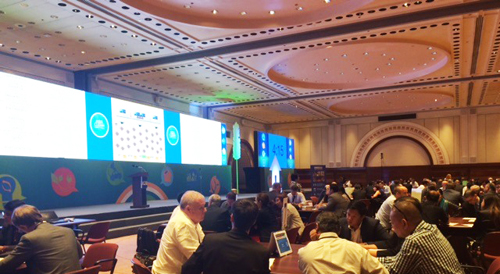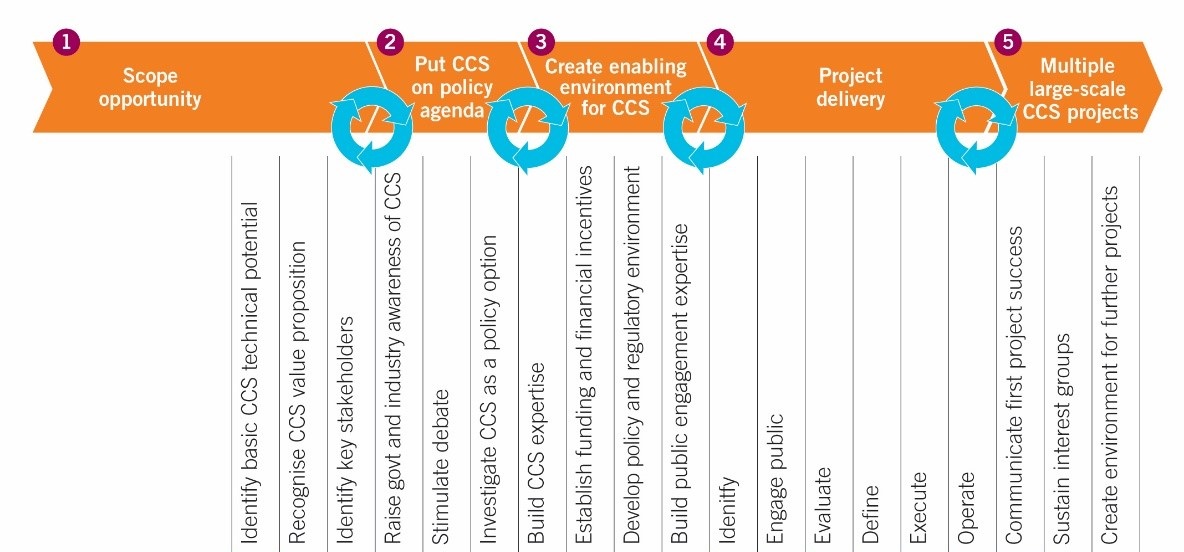Insights and Commentaries
ADB – connecting the policy, technology and finance communities
15th July 2015
Topic(s): Capacity development, Carbon capture, Renewables, use and storage (CCUS)
The Asian Development Bank’s (ADB) Clean Energy Forum 2015 was held in Manila, Philippines from 16-19 June. A key aim of the Forum is to link the policy, technology and finance communities. The Global CCS Institute supports the conference through its role as a major donor to the ADB’s Carbon Capture and Storage (CCS) Trust Fund. The Institute’s Principal Manager Capacity Development, Alice Gibson attended the conference and delivered a presentation on ‘Developing Capacity for Carbon Capture and Storage’. In this Insight Alice gives an update on the conference and some of the Institute's initiatives on capacity development in the Asia region.

Networking over afternoon tea at the ADB Clean Energy Forum 2015. Image: Global CCS Institute
The ADB Clean Energy Forum is probably the largest clean energy event in the Asia Pacific region – with about 1000 participants. It is held annually with the 2015 event taking place in Manila, Philippines. The Global CCS Institute is a regular participant of the Clean Energy Forum, providing support through the ADB CCS Trust Fund. This year I represented the Institute and gave a presentation on ‘Developing Capacity for Carbon Capture and Storage’. In the presentation I emphasised the need to tailor capacity development to a specific country’s needs. While tailoring an approach is not prescriptive, nevertheless there are some useful tools and processes that can be applied.
A useful process that the Institute starts with when it first engages with a country on capacity development is to undertake an assessment - with input from in-country stakeholders - about where that country sits on the ‘CCS Development Lifecycle’ (see below).

The CCS Development Lifecycle Source: Global CCS Institute
The assessment helps to identify where it makes sense to target capacity development activities. For instance, it might make sense for a country to focus on developing public engagement guidelines, or develop a CCS legal and regulatory framework.
But how does a country tailor these processes to their own situation? There is no one answer. A dialogue between in-country stakeholders that know their own circumstances, and international experts that are familiar with the topics (eg from organisations like the Global CCS Institute, the ADB and the International Energy Agency (IEA)) can help tailor an approach. The dialogue will often start with:
- broadly identify what the key issues are (eg what are the legal and regulatory issues that are specific to CCS?)
- share what other jurisdictions have done (from a process as well as content perspective).
This provides a good basis for coming up with a tailored approach that makes sense for the country in question.
Below are just two tailored capacity development activities that the Institute has been involved in, focusing on developing capacity at different parts of the CCS Lifecycle.
Malaysia CCS 101:
In Malaysia the Institute helped four Malaysian Universities introduce a CCS 101 course into relevant Masters Programs. This was part of helping Malaysia develop CCS technical understanding in the academic sector and future engineers and geologists.
Trinidad & Tobago legal and regulatory review:
Trinidad and Tobago commissioned a CCS Scoping Study, finalised in 2013, to examine if it makes sense for CCS to be one of their low-emission strategies. As part of this CCS focus, the Institute drafted a legal and regulatory review for the Trinidad and Tobago government. This process offered an opportunity to raise awareness of CCS through two consultation workshops and one-on-one meetings with a wide range of relevant Ministries and stakeholders.
A local legal firm was also engaged to develop a ‘Permitting Matrix’; a detailed review of all existing approvals, licences, planning permissions, certificates, guidelines etc. that would be applicable to a CCS project. This was particularly relevant as CCS is often categorised as an industrial or power generation project. The review revealed that a CCS project could be regulated within the existing regulatory system with some amendments.
The Institute continues to work with a number of Members on capacity developing activities, and is always looking for ways to help our Members develop ‘institutional innovation’.